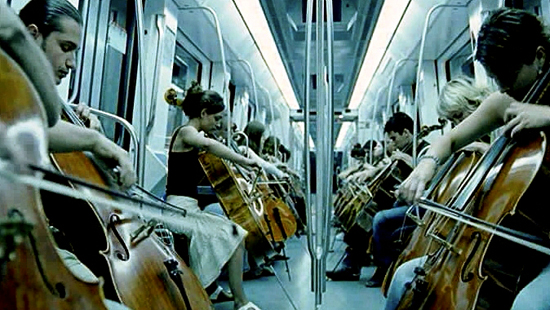|
Reviews of Recent Independent, Foreign, & Documentary Films in Theaters and DVD/Home Video
Directed by Pere Portabella Written by Pere Portabella, Xavier Albertí, Carles Santos Director of Photography, Tomàs Pladevall Editing by Óskar Gómez Language: Spanish, Catalan & German with English subtitles Spain. 102 min. Not Rated With Christian Brembeck, Jaume Melendres & Georgina Cardona What did the world sound like before Bach’s music? Celebrated Spanish surrealist Pere Portabella’s latest film is a genre-less exploration of that question, highlighting both the music and other sounds: a comb moving through a man’s hair, a dog’s footsteps, the whoosh of trucks passing each other on a highway, as well as silence. In some ways, The Silence Before Bach is profound, both as a meditation on the meaning of music and as a subtle study of European history. One of the film’s most rousing scenes features cellists performing in a moving, otherwise empty subway train. As the camera pans through the car, it’s surprising how many musicians are actually there – it seems like an infinite number, each one unique, making incredible sounds together, creating great motion. (Had the title been The Stillness Before Bach, it would have been just as apt.) After the subway stops, the cellists lug their instruments off the train and trudge upstairs, looking surprisingly ordinary after the superhuman sounds they made just moments before. In another scene, a bookseller tells a customer the story of Polish women in a Nazi concentration camp who were forced to listen to Christmas carols. The nostalgia was too much to bear – the women screamed and begged the musicians to stop, to let them die in peace. “The music hurts,” says the bookseller, and in the next frame a piano, crushed, is dropped into an otherwise still ocean. Portabella aims to show the relationship between the music and the everyday, and sometimes he succeeds brilliantly, as in a reenactment of Mendelssohn’s enthusiastic butcher wrapping his best meats in the original sheet music for the St. Matthew Passion. At other times, the historical reenactments are spotty, and there are long, tiresome scenes interspersed with those that are intense or insightful. At one point, the camera lingers on a showering woman, a cellist, for what feels like an eternity, and a tour guide in Leipzig, dressed as Bach, has a dull dialogue with a bartender as he orders his usual hot chocolate. On the other hand, Portabella’s choice to show the real Europe – to focus on spaces that are ugly or merely bland, lacking grandeur, devoid of natural beauty – gives the film an interesting realism and grit. Some vignettes and story lines, like the departure of the cellist for a tour after her shower finally ends, are so mundane that their inclusion is inexplicable.
TV commercials make me teary, opera makes me weepy, and bawling doesn’t even begin to describe my response the first two times I saw
Wings of Desire – so it’s telling that I stayed dry-eyed though The Silence Before Bach, which stops just short of delivering the kind of
powerful, explosive transformation that Bach’s music can create.
Elizabeth Bachner
|

